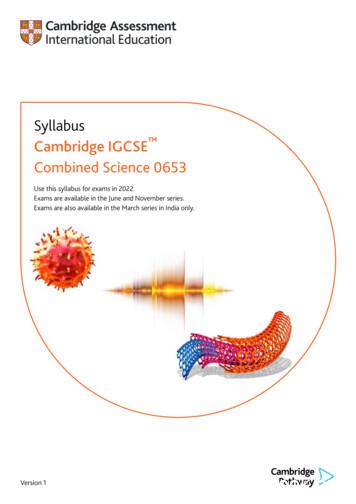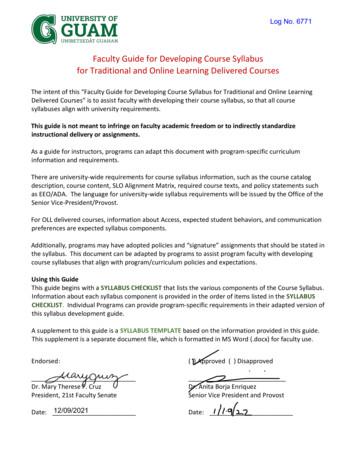2021 BASIC TRAINING PROGRAM SYLLABUS
2021 BASIC TRAINING PROGRAM SYLLABUSWelcome to the Department of Corrections Training Academy Basic Training program. The BasicTraining program is a pre-service training program for all new staff entering the PennsylvaniaDepartment of Corrections. New staff include all classifications who work to deliver correctional servicesthat spans “Institutions” (State Correctional Institutions), Field Services (Probation and Parole), Re-entryServices (Bureau of Community Corrections), Training Services (Training Academy), CorrectionalIndustries (CI) and Administrative Services (Central Office).Through the Basic Training program, staff are exposed to the agency’s mission and team culture,general expectations while working in the agency, Department of Corrections policies and procedures,and the content and skills that will equip them with the necessary foundation to effectively andsuccessfully perform in their respective positions.The Department of Corrections training program prides itself in bringing relevant and quality training toall staff entering the agency. Our mission at the Academy is to "provide state-of-the-art training servicesand programs that are relevant, timely and effective, embracing new technologies with a keen focus oncustomer service and professionalism. We serve the Department’s mission by preparing new and currentstaff to provide quality correctional services, while continuing to develop our future leaders."PERFORMANCE GOALSStaff attending the Basic Training program can expect to be able to:1. Communicate effectively with parolees, re-entrants, inmates, staff, visitors, and the public in theperformance of their job duties2. Apply professional and ethical behavior in the performance of their job duties3. Practice the fundamentals of static and dynamic security specific to a correctional setting4. Determine what observations and actions need to be reported and documented, and utilize theproper chain-of-command5. Demonstrate characteristics to participate effectively as a member of a work team6. Correct negative behaviors and reinforce positive behaviors displayed by inmates or re-entrantsin their facility7. Apply evidence-based practices in the supervision of inmates, parolees and re-entrants8. Perform all duties within facilities and communities in a safe and effective mannerTraining Academy1451 North Market StreetElizabethtown, Pennsylvania 17022Phone: 717-367-9070 Fax: 717-367-5858
EVALUATIONStudents will demonstrate proficiency through skills practice, skills tests, informal feedback, weeklyexaminations, and attaining certifications. The course is continually evaluated through end of courseevaluations and observations by training staff.Note: All participants are required to pass weekly written examinations with a minimum score of 75%.Individual courses may also require written and/or demonstration of skills for qualification (such asCPR/AED and BFA) and are identified in the Basic Training Course Description Booklet. The BasicTraining Handbook conveys the rules and expectations while attending Basic Training.REFERENCES Department of Corrections Policy 5.1.1, “Staff Development and Training.”Department of Corrections Policy 4.1.1, “Human Resources and Labor Relations.”Department of Corrections Policy 6.3.1, “Facility Security.”61 Pa.C.S. §6112Board of Probation and Parole Procedures, Chapters 2, 3, and 4PREA National StandardsCorrectional Training Academies, 1st Edition (CTA)Adult Correctional Institutions, 5th Edition (ACI).Adult Residential Community Services, 4th Edition (ACRS)Adult Probation and Parole Field Services, 4th Edition (APPFS)American Safety and Health Institute (ASHI) Standards.BASIC TRAINING PROGRAM SYLLABUSThe respective program and course syllabuses for the below groups and classifications are found on thefollowing pages.Parole Agents – Field and InstitutionPg. 3Corrections OfficersPg. 5H-1 Non-CO/Contact – Food Service and Maintenance Staff– Community Corrections CenterMonitorsPg. 7Contact and Licensed Professional Staff (non-medical)Pg. 9Pg. 10Contact and Licensed Professional Staff (medical)Administrative Support and Management Staff2021 Basic Training Program SyllabusPg. 112 of 11
Parole Agents – Field and InstitutionCourse Title257 Series-Arrest ReportsAn Overview of Evidence Based PracticesArrest and ControlBasic First Aid CertificationChain of Command and MentoringContraband and SearchesCPR/AED (Adult Only) CertificationDomestic ViolenceDrug AwarenessEvidenceEffective Practices in Community Supervision (EPICS)Fundamentals of SecurityHearing Training/Beyond PreponderanceHostage SurvivalImpact Weapon TrainingIncident Command System (PPB)Infectious DiseasesInitial FirearmsInmate Disciplinary ProceduresInstitutional Parole TrainingInterstate Compact/ICOTS InstitutionalJNET Presentation (Guest Speaker)Limits of ForceLevel of Service – Revised Scoring Guide (LSI-R)Mandated Reporter TrainingMental Health First Aid (MHFA)Motivational InterviewingOffice of the Victim Advocate (OVA)Oleoresin Capsicum (PPB)Overview of Probation & Parole LawPaperwork TrainingPPB 30 Investigations2021 Basic Training Program gent 03.007.5015.002.003.002.003.502.003 of 11
Prison Rape Elimination Act (PREA)Professional Boundaries: Safety, Awareness and ExpectationsReport WritingS.P.E.A.R SystemSearch & SeizureSecurity Threat Group AwarenessSentencing in PASex Offender Supervision StrategiesSexual Harassment Awareness and PreventionStaff Safety SkillsSubstance Abuse Testing/Urinalysis/GPS/ Medications AssistedTreatmentSuicide Prevention and InterventionTASERTech Parole Violators/Scenarios, Violation Sanctioning GridVerbal JudoAdministrativeTotal Hours2021 Basic Training Program 6.503.754.0050.00292.004.003.754.0050.00288.504 of 11
Corrections OfficersCoursesAssault Management Applications in Corrections (AMAC) Course 1Assault Management Applications in Corrections (AMAC) Course 2Assault Management Applications in Corrections (AMAC) Course 3Assault Management Applications in Corrections (AMAC) Course 4Assault Management Applications in Corrections (AMAC) Course 5Assault Management Applications in Corrections (AMAC) Course 6Basic First Aid CertificationContraband and SearchesCPR/AED (Adult Only) CertificationDrug AwarenessElectronic Immobilization Device (EID) CertificationFirearmsFundamentals of SecurityHostage SurvivalIncident Command SystemIncident Response Responsibilities and ProceduresInfectious DiseasesInmate Disciplinary ProceduresInmate Supervision and AccountabilityImmediate Action Skills (IAS) ScenariosLeadership and MentoringLegal Aspects of CorrectionsManipulation: The Con GameMental Health First Aid (MHFA)Naloxone Training (WBT)Oleoresin Capsicum CertificationOrientationPrison Rape Elimination Act (PREA)Professional Boundaries: Safety, Awareness and ExpectationsReport WritingRiot/Individual BatonSecurity RestraintsSecurity Threat Group AwarenessSexual Harassment Awareness and PreventionStress ManagementSuicide Prevention and InterventionTactics for Effective Communications in Corrections (TECC) ITactics for Effective Communications in Corrections (TECC) II2021 Basic Training Program SyllabusCorrections Officers(5 04.003.505 of 11
Use of ForceAdministrativeTotal Hours2021 Basic Training Program Syllabus1.5049.25167.006 of 11
H-1 Non-CO/Contact – Food Service and Maintenance Staff – Community Corrections CenterMonitorsCoursesAssault Management Applications in Corrections (AMAC) Course 1Assault Management Applications in Corrections (AMAC) Course 2Assault Management Applications in Corrections (AMAC) Course 3Assault Management Applications in Corrections (AMAC) Course 4Assault Management Applications in Corrections (AMAC) Course 5Assault Management Applications in Corrections (AMAC) Course 6Basic First Aid CertificationContraband and SearchesCPR/AED (Adult Only) CertificationDrug AwarenessFundamentals of SecurityHostage SurvivalImmediate Action Skills (IAS) ScenariosIncident Command SystemIncident Response Responsibilities and ProceduresInfectious DiseasesInmate Disciplinary ProceduresInmate Supervision and AccountabilityLeadership and MentoringLegal Aspects of CorrectionsManipulation: The Con GameMental Health First Aid (MHFA)Naloxone Training (WBT)Oleoresin Capsicum CertificationOrientationPrison Rape Elimination Act (PREA)Professional Boundaries: Safety, Awareness and ExpectationsReport WritingRiot/Individual BatonSecurity RestraintsSecurity Threat Group AwarenessSexual Harassment Awareness and PreventionStress ManagementSuicide Prevention and InterventionTactics for Effective Communications in Corrections (TECC) I2021 Basic Training Program SyllabusH-1 Non-COs(4 000.502.505.501.503.003.001.001.001.004.004.007 of 11
Tactics for Effective Communications in Corrections (TECC) IIUse of ForceAdministrativeTotal Hours2021 Basic Training Program Syllabus3.501.5043.25144.008 of 11
Contact and Licensed Professional Staff (non-medical)CoursesAssault Management Applications in Corrections (AMAC) Course 1Assault Management Applications in Corrections (AMAC) Course 2Basic First Aid CertificationContraband and Searches (lecture only)CPR/AED (Adult only) CertificationDrug AwarenessFundamentals of SecurityHostage SurvivalIncident Command SystemIncident Response Responsibilities and ProceduresInfectious DiseasesInmate Disciplinary ProceduresInmate Supervision and AccountabilityLeadership and MentoringLegal Aspects of CorrectionsManipulation: The Con GameMental Health First Aid (MHFA)Naloxone Training (WBT)Oleoresin Capsicum (lecture only)OrientationPrison Rape Elimination Act (PREA)Professional Boundaries: Safety, Awareness and ExpectationsReport WritingSecurity Threat Group AwarenessSexual Harassment Awareness and PreventionStress ManagementSuicide Prevention and InterventionTactics for Effective Communications in Corrections (TECC) ITactics for Effective Communications in Corrections (TECC) IIUse of ForceAdministrativeTotal Hours2021 Basic Training Program SyllabusNon-Med(2 001.001.004.004.003.501.5033.00104.009 of 11
Contact and Licensed Professional Staff (medical)CoursesAssault Management Applications in Corrections (AMAC) Course 1Assault Management Applications in Corrections (AMAC) Course 2Basic First Aid CertificationContraband and Searches (lecture only)Basic Life Support Certification1Drug AwarenessFundamentals of SecurityHostage SurvivalIncident Command SystemIncident Response Responsibilities and ProceduresInfectious DiseasesInmate Disciplinary ProceduresInmate Supervision and AccountabilityLeadership and MentoringLegal Aspects of CorrectionsManipulation: The Con GameMental Health First Aid (MHFA)Naloxone Training (WBT)Oleoresin Capsicum (lecture only)OrientationPrison Rape Elimination Act (PREA)Professional Boundaries: Safety, Awareness and ExpectationsReport WritingSecurity Threat Group AwarenessSexual Harassment Awareness and PreventionStress ManagementSuicide Prevention and InterventionTactics for Effective Communications in Corrections (TECC) ITactics for Effective Communications in Corrections (TECC) IIUse of ForceAdministrativeTotal Hours1Medical(2 001.001.004.004.003.501.5033.50108.00Medical Staff receive Basic Life Support course (6 hours) in lieu of CPR/AED2021 Basic Training Program Syllabus10 of 11
Administrative Support and Management StaffCoursesAssault Management Applications in Corrections (AMAC) Course 1Assault Management Applications in Corrections (AMAC) Course 2Fundamentals of SecurityHostage SurvivalIncident Command SystemInmate Supervision and AccountabilityLeadership and MentoringLegal Aspects of CorrectionsMental Health First Aid (MHFA)Naloxone Training (WBT)OrientationPrison Rape Elimination Act (PREA)Professional Boundaries: Safety, Awareness and ExpectationsSexual Harassment Awareness and PreventionTactics for Effective Communications in Corrections (TECC) IUse of ForceAdministrativeTotal Hours2021 Basic Training Program SyllabusNon 02.505.501.004.001.5019.5061.0011 of 11
2021 Basic Training Program Syllabus 7 of 11 H-1 Non-CO/Contact – Food Service and Maintenance Staff – Community Corrections Center Monitors Courses H-1 Non-COs (4 Weeks) Assault Management Applications in Corrections (AMAC) Course 1 3.75 Assault Management Applications in Corrections (AMAC) Course 2 3.75 Assault Management Applications in Corrections (AMAC) Course 3 3.75
August 2, 2021 15 August 2, 2021 16 August 2, 2021 17 August 3, 2021 18 August 4, 2021 19 August 5, 2021 20 August 6, 2021 21 August 9, 2021 22 August 9, 2021 23 August 9, 2021 24 August 10, 2021 25 August 11, 2021 26 August 12, 2021 27 August 13, 2021 28 August 16, 2021 29 August 16, 2021 30 August 16, 2021 31
Version 1.13 P l e a s e r e a d : Creating a syllabus or overview will not affect the Canvas Syllabus or Syllabus Creator tool. However, If a syllabus is published within CreatorPro LTI, the Canvas Syllabus or Syllabus Creator tool is replaced with CreatorPro’s Syllabus and to revert the changes a SSD Support Case will need to be
Syllabus of Sixth Semester B. Pharm. 069 11. Syllabus of Seventh Semester B. Pharm. 081 12. Syllabus of Eight Semester B. Pharm. 091 B Ordianance and Rules (M. Pharm.) 101 1. Ordinance and Rules 102 2. Structure of Syllabus 107 C. Syllabus (Pharmaceutics) 115 D. Syllabus (
posts by the due date. There is no make-up for quizzes (instead, I will drop two lowest grades). For exams, make-ups will be considered only for legitimate reasons with proper documentation. THIS IS A SAMPLE SYLLABUS - Current course syllabus is available within Canvas SAMPLE Syllabus SAMPLE Syllabus SAMPLE Syllabus Syllabus
Changes to this syllabus for 2022 62 Changes to this syllabus For information about changes to this syllabus for 2022, go to page 62. The latest syllabus is version 1, published September 2019. Any textbooks endorsed to support the syllabus for examination from 2019 are still suitable for use with this syllabus.
over to the new syllabus. (iii) In other words, from December, 2012 to June, 2013 session of examination both syllabi (existing syllabus as well as new syllabus) will run parallel. 5. Switchover to new syllabus (i) Students under the existing syllabus may switch over to the new syllabus. They
Computer Science ATAR Year 11 syllabus . Organisation . This course is organised into a Year 11 syllabus and a Year 12 syllabus. The cognitive complexity of the syllabus content increases from Year 11 to Year 12. Structure of the syllabus . The Year 11 syllabus is divided into two unit
Faculty Guide for Developing Course Syllabus 2 SYLLABUS CHECKLIST NOTE: THE ORDER OF SYLLABUS COMPONENTS PRESENTED BELOW IS NOT A REQUIRED ORDER TO FOLLOW. THIS CHECKLIST REFLECTS COMPONENTS THAT SHOULD BE INCLUDED IN THE COURSE SYLLABUS. FACULTY WILL DETERMINE THE ORDER OF THE SYLLABUS COMPONENTS. Course ID and Instructor Information _ 1.























